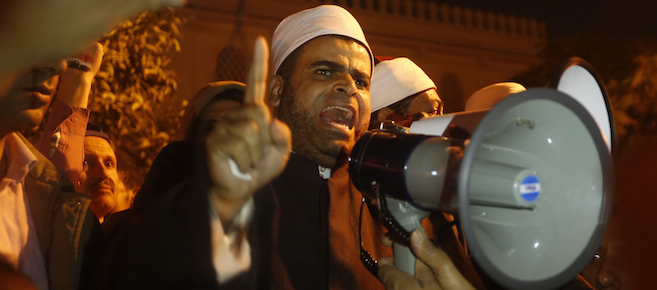Michael Petrou on the shifting alliances of Egypt’s revolution
Mubarak supporters, opponents march together in Tahrir Square
A cleric from Al-Azhar, Egypt’s most respected Islamic institution, addresses protesters in front of the presidential palace during a demonstration in Cairo, Egypt, Tuesday, Dec. 11, 2012. Thousands of opponents and supporters of Egypt’s Islamist president staged rival rallies in the nation’s capital Tuesday, four days ahead a nationwide referendum on a contentious draft constitution. (AP Photo/Petr David Josek)
Share

Revolutions make for unlikely allies, and Egypt’s is no exception.
I first met Mahmoud Ibrahim on the patio of an outdoor café in a trendy Cairo neighbourhood in October. He spoke clear English, had at least two smart phones, and was on this way to the United States to volunteer for Barack Obama’s re-election campaign after receiving a fellowship from an American NGO.
Ibrahim was a devoted supporter of the recently deposed Egyptian president, Hosni Mubarak, and had worked on the campaign of Ahmed Shafik, Mubarak’s last prime minister, who ran unsuccessfully to succeed him.
Ibrahim rejected the suggestion that Mubarak was a dictator and was of course opposed to the massive protests that toppled him. Egypt’s revolutionaries were not his political comrades then. Now many of them are.
In November, Egypt’s new president, Mohamed Morsi, a longtime member of the Islamist Muslim Brotherhood, granted himself sweeping new powers — some of which he’s since rescinded in the face of public uproar — in order to ensure the passage of a new constitution that was written by Islamists and will be voted on in a referendum this Saturday.
Morsi’s moves have triggered weeks of protests by liberal and secular Egyptians who believe he and other political Islamists have hijacked their revolution. Many of the Egyptians who stormed Tahrir Square almost two years ago to bring down Mubarak are now in the streets again, confronting what they see as a new, religiously tainted dictatorship. This time Ibrahim is on the streets with them.
I reached him by phone this afternoon, as pro and anti-Morsi demonstrations were building in Cairo. Ibrahim is back in the Egyptian capital after volunteering during American election. He says he joined Mitt Romney’s campaign rather than Obama’s, and therefore enjoyed the trip even more.
Ibrahim says he is not protesting against President Morsi as an individual. Morsi, says, Ibrahim, is the elected president. But Ibrahim is protesting against what he describes as the fascist and dictatorial measures Morsi has taken by removing or weakening checks on his powers, and by rushing through an illiberal constitution whose authors are almost exclusively Islamists.
“The process, this is very important. If you want a real constitution, we all have to share in it,” he says.
I asked Ibrahim what it felt like to now be marching side-by-side with the same revolutionaries who deposed Mubarak, the president he supported.
“This is the funny part of the thing,” he says. “We agree that I was against the revolution and I was against Tahrir Square. But when we see each other, we laugh. They are my friends, and we know each other.
“Now it’s not about Mubarak or Morsi. Maybe after we block this constitutional declaration, maybe we are going against each other again. But now we are facing a critical moment. We know it is about country. If Morsi passes all this stuff, we are going to be totally like maybe Iran, maybe Sudan, maybe Afghanistan. We don’t know. So this is about the future.”
Egyptian opposition groups have not yet decided whether to boycott Saturday’s referendum on the new constitution, or to mobilize their supporters to vote against it. Ibrahim says a consensus may not be reached until Friday night.